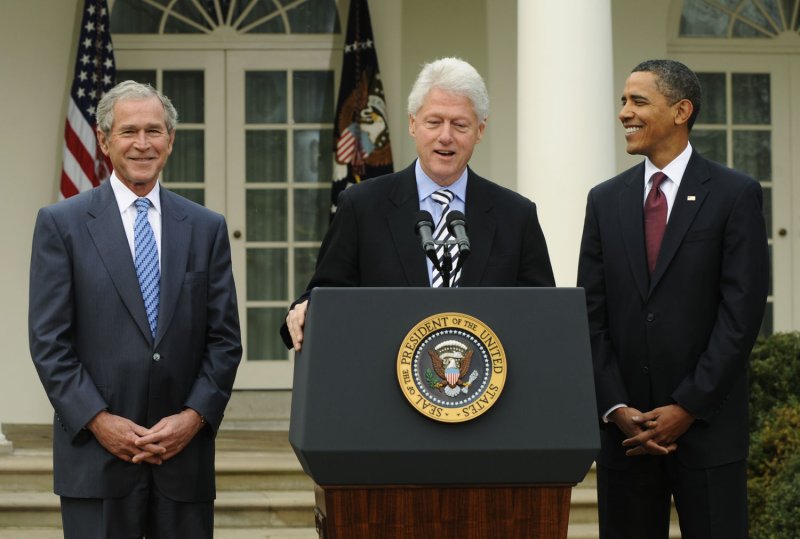Former President Bill Clinton speaks, as U.S. President Barack Obama (R) and former President George W. Bush look on, in the Rose Garden of the White House in Washington on January 16, 2010. UPI/Alexis C. Glenn |
License Photo
WASHINGTON, Oct. 12 (UPI) -- One symptom of insanity is repeating the same action and expecting a different outcome. Cynics often accuse the United States of falling into that trap in conducting its foreign policy.
Over the past 50 years, a litany of stunning failures makes the case. Fortunately, one greater success provided America with safe passage -- that is until this symptom returned about a decade ago.
The great victory was the peaceful demise of the Soviet Union. Despite those who claimed that it was U.S. policy over the years catalyzed by Ronald Reagan's tough stance toward Moscow that forced Soviet Russia to implode, the irrationality of the Communist political and economic structure triggered systemic collapse. Indeed, one could argue that the U.S.S.R. was destroyed by the expectation that socialism could produce different results.
U.S. failures have been numerous dating to John F. Kennedy's administration and before. The two most catastrophic -- extending and exacerbating the Cold War and the Vietnam debacle -- arose from Kennedy's belief that adversaries were expected to act as we would or be in need of education to bring them up to our level.
Hence, he failed to acquire the necessary knowledge and understanding to make sound judgments, assuming that those judgments would have been satisfactory in the first place.
JFK entered office with the conviction that the U.S.S.R. was far more powerful and capable, militarily and economically, than it was. In response, his administration began a huge military buildup of nuclear and conventional forces and undertook a more assertive foreign policy marked by the Bay of Pigs fiasco in April 1961.
Moscow, under the leadership of First Secretary Nikita Khrushchev, had embarked on a policy of rapprochement two years earlier in reaction to U.S. President Dwight Eisenhower's overtures. Kennedy ignored that.
After the Cuban Missile Crisis in the fall of 1962, the U.S.S.R. reverted to form and the Cold War would continue for nearly 30 years.
American blunders in Vietnam were too numerous and painful to recall. The war wasn't about stopping communism's spread at the Mekong so it wouldn't have to be fought at the Mississippi, as was argued at the time. And the strategy of attrition marked by enemy body counts was repetition of a failed tactic with the expectation of a different outcome.
The combination of the end of the Soviet Union and then Operation Desert Storm that liberated Kuwait and annihilated Saddam Hussein's army in 1991 cleared the way for what should have been American dominance of the 21st century.
Unfortunately, the symptom or flaw in U.S. political DNA reasserted itself following Sept. 11, 2001.
Wars in Afghanistan, Iraq and against global terror became the newest American crusades. A decade later, those conflicts were far from resolved and new crises in the Middle East and North African littoral, nominally referred to as the Arab Spring, have spawned new dangers and challenges to global peace and stability at a time when global economies face potential meltdown if the financial crises aren't properly resolved.
In America, the 2012 presidential campaign is in full swing, more than a year in advance of the election. Focus is inward and foreign policy has been and will be understandably overwhelmed by the troubling state of the economy and unemployment that still persists at more than above 9 percent. Unfortunately, no obvious self-righting mechanisms are in place to ensure that stability not chaos and violence will prevail abroad.
In a perfect world, candidates would be expected to demonstrate their knowledge and understanding of these critical issues. From those measures, voters could evaluate the judgment of each aspirant and vote accordingly. However, this is more than wishful or rationale thinking. Too many past presidential campaigns have demonstrated that outcomes based on this logic are exceedingly rare.
Both the current Republican field and the Democratic incumbent have demonstrated little appetite for revealing their knowledge and understanding of these issues. For the out-of-power party, this is a perennial problem as few if any candidates have had much real prior experience. For the party in power, the default response is to defend current policies and actions no matter their merits.
Bill Clinton, George W. Bush and Barack Obama each entered office with insufficient knowledge and understanding of virtually all important issues especially foreign policy.
Clinton was lucky in that he inherited the good work of his predecessor George H.W. Bush -- the last president who actually had the requisite experience for the office. Bush senior wasn't re-elected.
Obama is correct in acknowledging few presidents had been dealt worse hands at the outset. That said, does Obama now have the necessary knowledge, understanding and judgment to deserve another four years?
Unfortunately, no Republican in the field has so far demonstrated those capacities either. So, are we insane to expect a better outcome in 2012?
--
(Harlan Ullman is chairman of the Killowen Group, which advises leaders of government and business, and is senior adviser at Washington's Atlantic Council.)
--
(United Press International's "Outside View" commentaries are written by outside contributors who specialize in a variety of important issues. The views expressed do not necessarily reflect those of United Press International. In the interests of creating an open forum, original submissions are invited.)















